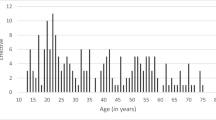Abstract
Data from 690 persons in three adult age groups were used to evaluate the generality of a componential model of happiness (Kozma et al., 1990). The model postulates that long- and short-term affective states combine in an additive manner to produce current happiness. The short-term components should be more susceptible to environmental manipulation than the long-term ones and should change more readily with an appropriate experimental manipulation. Subscales of the Memorial University Mood Scale (MUMS) were used to assess short-term affect while the experience subscales of the Memorial University of Newfoundland Scale of Happiness (MUNSH) and Diener's Long-term Satisfaction Scale were used to measure long-term affect. Overall current happiness was assessed by a seven-point avowed happiness rating scale. The Velten mood induction procedure was used to manipulate current affective state. In five of six comparisons, changes on short-term components were significantly greater than on long-term components. Age differences in reactivity to mood induction emerged only when a negative induction procedure was followed by a positive one. Under these conditions, the youngest cohort responded more consistently than the oldest cohort. An additive model, based on long- and short-term affect, age, and sex produced the best explanation for current happiness.
Similar content being viewed by others
References
Bradburn, N. M.: 1969, The Structure of Psychological Well-Being (Aldine, Chicago).
Bradburn, N. M. and Caplovitz, D.: 1965, Reports on Happiness (Aldine, Chicago).
Costa, P. T. and McCrae, R. R.: 1984, ‘Personality as a lifelong determinant of well-being’, in C. Z. Malatesta and C. E. Izard (eds) Emotion in Adult Development (Sage, Beverly Hills, CA).
Diener, E.: 1984, ‘Subjective well-being’, Psychological Bulletin 95, 542–575.
Diener, E., Emmons, R., Larsen, R., and Griffin, S.: 1985, ‘The satisfaction with life scale’, Journal of Personality Assessment 49, 71–75.
Kozma, A.: 1991, Mood and Disposition Components of Happiness, invited colloquium presentation, University of Victoria, Feb.
Kozma, A.: 1986, The Structure of Happiness, invited address to the Canadian Psychological Association, Toronto, June.
Kozma, A. and Stones, M. J.: 1983, ‘Predictors of happiness’, Journal of Gerontology 38, 626–628.
Kozma, A. and Stones, M. J.: 1980, ‘The Measurement of Happiness: Development of the Memorial University of Newfoundland Scale of Happiness (MUNSH)’, Journal of Gerontology 35, 906–912.
Kozma, A., Stones, M. J., and McNeil, J. K.: 1991, ‘Psychological well-being in later life’, (Butterworths, Toronto).
Kozma, A., Stone, S., Stones, M. J., Hannah, T. E., and McNeil, J. K.: 1990, ‘Long- and short-term affective states in happiness: Model, paradigm and experimental evidence’, Social Indicators Research 22, 119–138.
McNeil, J. K.: 1987, Mood: Measurement, Diurnal Variation and Age Effects, unpublished Ph.D. thesis, MUN.
Stones, M. J. and Kozma, A.: 1986a, ‘Happiness and activities as propensities’, Journal of Gerontology 41, 85–90.
Stones, M. J. and Kozma, A.: 1986b, ‘Happy are those who are happy ...: a test between two causal models of relationships between happiness and its correlates’, Experimental Aging Research 12, 23–29.
Stones, M. J. and Kozma: 1989, ‘Happiness and activities in later life: a propensity formulation’, Canadian Psychology 30, 226–237.
Stones, M. J. and Kozma, A.: 1991a, ‘A magical model of happiness’, Social Indicators Research 24, 43–62.
Stones, M. J. and Kozma, A.: 1991b, ‘A magical model of happiness to predict individual differences in mood change’, Social Indicators Research 25, 59–67.
Velten, E.: 1968, ‘A laboratory task for induction of mood states’, Behavior Research and Therapy 6, 473–482.
Yardley, J. K. and Rice, R. W.: 1991, ‘The relationship between mood and subjective well-being’, Social Indicators Research 24, 101–111.
Author information
Authors and Affiliations
Additional information
The data reported here represent wave 1 of a five-year longitudinal study on the Components of Happiness supported by SSHRCC Grant 410-88-0773.
Rights and permissions
About this article
Cite this article
Kozma, A., Di Fazio, R., Stones, M.J. et al. Long- and short-term affective states in happiness: Age and sex comparisons. Soc Indic Res 27, 293–309 (1992). https://doi.org/10.1007/BF00303851
Accepted:
Issue Date:
DOI: https://doi.org/10.1007/BF00303851




